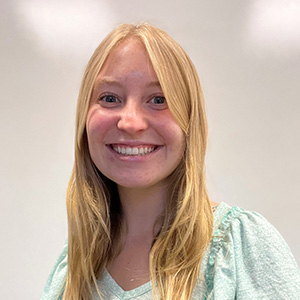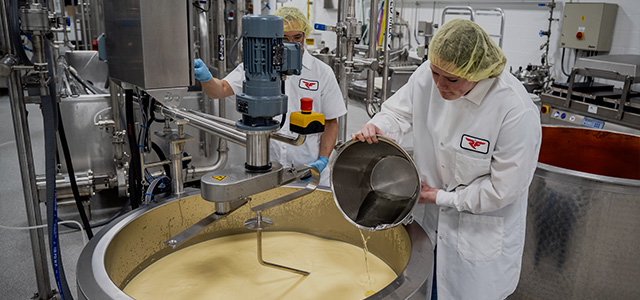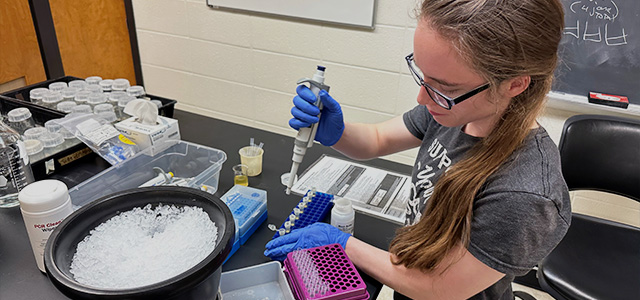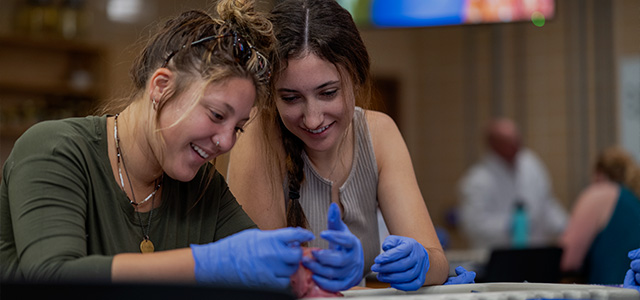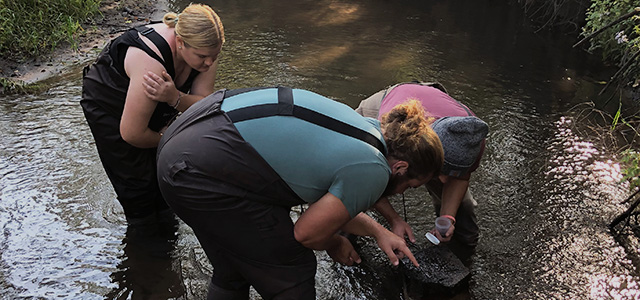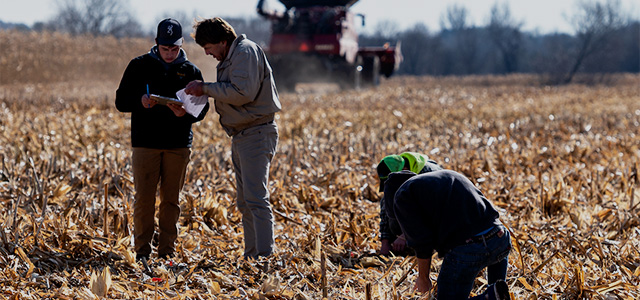
Academics
Take the Next Steps
Contact Us
College of Agriculture, Food and Environmental Sciences
Email: laura.walsh@uwrf.edu
Phone: 715-425-3535
College of Agriculture, Food and Environmental Sciences
Welcome to the College of Agriculture, Food and Environmental Sciences. Around campus you’ll hear us called CAFES. We’re home to more than a dozen majors, award-winning faculty, and a variety of unique facilities, including two farms, two forests, a greenhouse, dairy and meat processing plants, and a host of specialized labs for plant tissue culture, bioprocessing, and so much more. These facilities are at the heart of what we do – help students learn and apply science, engineering, business and management skills to solve real world problems in areas like food production and environmental protection.
600+
Acres of Laboratory Farms
45+
CAFES student organizations
Our Academics
CAFES has 16 different majors – lot of options! So many options can make it difficult to choose just one, so we’ve grouped them into seven broad categories to make it easier for you to narrow down your choices.
- Animals: Animal science is a signature program at UWRF. We offer four specialty areas for you to choose from: equine, meat animal, companion animal or veterinary technology. Wisconsin is known as the dairy state, so we have a thriving dairy science major too.
- Business: Stand out from the crowd of general business majors by choosing agricultural business. Or gain a global perspective through international food operations management (IFOM), where students collaborate in a co-hort, studying in sync at UWRF and Aeres University in the Netherlands. Aeres students spend one year at UWRF, UWRF students spend one year at Aeres, and students receive degrees from both universities.
- Education and Communication: Agricultural education equips you with the skills to engage with youth in formal classroom settings or more laid-back environments like 4-H or environmental education programs. There are opportunities to work with adults too, through extension and farm business management programs or agricultural finance and sales. If you're passionate about agriculture, consider diving into marketing communications where you can assist agribusinesses in sharing their narrative, boosting their visibility, and promoting their products.
- Engineering and Technology: Engineers draw on the science behind problems to design and develop solutions. In agricultural engineering, the problem might involve a challenge in food processing or making the equipment used for harvesting more efficient. In environmental engineering, you might be designing a new system to treat wastewater and send it back into the environment. Engineering technology may be a good fit if you prefer less rigorous math and science.
- Environment and Natural Resources: Some of the greatest challenges the world faces are in this area. You could choose geology, the very fundamental study of the earth, or learn how to care for and protect our natural resources for future generations in conservation and environmental planning. Environmental science combines geology, chemistry, hydrology, physics and more, to help address complex environmental challenges.
- Food: If you're curious about the journey of food from the farm to your plate or the safety and nutrition of what we eat, food science and technology could be a great match. If you are more interested in the business side of the food industry, international food operations management (IFOM) is a unique program under our business offerings. It’s truly international, you’ll receive degrees from both UWRF and Aeres University in the Netherlands.
- Plants and Soils: Plants and soils have a complex give and take relationship. Discover more about this relationship in crop and soil science, where the emphasis is on major crops produced in large quantities for trade. In horticulture, soil plays a crucial role for flowering plants, fruits, vegetables, and trees alike.
The CAFES Experience
CAFES is proud to offer a personalized, comprehensive and highly experiential education to our students. Whether you're studying crop production on a research plot, propagating plants in a horticulture class, training horses at the Campus Farm or completing an internship with an agriculturally-focused company, there's no shortage of ways to make the most of your education.
With our focus on using scientific knowledge to solve real-world, practical problems, CAFES has a wide range of specialized facilities:
- Two farms! The Mann Valley Farm, is just outside the city limits, and includes 2 classrooms and a pavilion, and is dedicated to production agriculture, with dairy, beef, sheep, swine, cropping and composting enterprises. The Campus Farm is primarily devoted to the equine program with indoor and outdoor riding arenas and breeding facilities.
- Two registered school forests
- A companion animal learning center, including spaces for animal adoption
- A newly renovated state-of-the art dairy manufacturing plant
- A meat processing plant
- An 8-room climate-controlled greenhouse
- Many specialized laboratory spaces - for bioprocessing, fabrication, CAD, geological specimen preparation, water and solid sample analytical chemistry, plant tissue culture, soils, foods, and more
- We make use of everything the campus has to offer including the plantings and landscape features, the prairie areas and the stream that runs through campus.
We can’t house everything on campus, so our students spend time off campus too, on field trips to diverse farms, artisan and large scale food processors, quarries, recreation and game management areas, lakes, plant nurseries and more.

The goal of the CAFES Internship Program is to create a uniquely beneficial experience for both students and employers. With assistance from faculty coordinators, we listen closely to our students’ career aspirations and work hard to find the perfect fit with local, regional, national and international organizations.
Not all CAFES majors require an internship, but they are strongly recommended for all programs. The vast majority of CAFES internships are paid experiences.

CAFES is home to several unique public/private partnerships that bring many opportunities for students to gain valuable hands-on skills, collaborate on a project with a faculty member, and extend their professional network well beyond UWRF.
Dairy Innovation Hub
The Hub is a state-wide initiative involving UW-River Falls, UW-Platteville and UW-Madison. An annual investment of $7.8M is supporting research and development at the three campuses. The objective is to keep Wisconsin’s dairy community at the global forefront of producing nutritious dairy products by focusing on economic, environmental, and social sustainability. There are 6 Hub faculty at UWRF who teach and do dairy related research with this objective in mind. All the research projects involve students. Specific projects range from studying the natural behavior of postpartum cows and their calves, to optimizing casein micelle nanoparticle formation for potential use as a delivery system for nutraceuticals, to gaining a better understanding of how dairy farms impact climate resiliency.
Ecological Restoration Institute
The Ecological Restoration Institute (ERI) helps students develop skills in natural resources on restoration projects around campus. ERI also offers opportunities to become certified in specific skills like wildland firefighter training, pesticide application, chainsaw safety, boat safety and more. These field experiences and certifications will help students land that first job out of college.
Humane Handling Institute
A first-of-its-kind program, the Humane Handling Institute (HHI) provides comprehensive hands-on training for humane livestock handling, stunning, and equipment maintenance. Certification through the program provides meat industry employees with the knowledge and skills to address key regulatory issues and strengthen consumer trust in meat processing establishments. The Institute is an outgrowth of work being done by faculty and students in the Animal Welfare Lab

CAFES supports a variety of active student organizations, intercollegiate judging teams and social and academic fraternities and sororities. Visit FalconsConnect to learn more about how you can get involved.

We are committed to helping you soar. CAFES students are eligible for a range of scholarships primarily based on their major, and only need to complete one application to be considered for all. The scholarships, generally totaling more than $200,000, are presented at the annual CAFES Scholarship and Awards event each April.

The agriculture training program that has stood the test of time is back. The Short Course is a 16-week residential program that provides world class, hands-on training targeting just what a student needs to know to step into the dairy industry. Courses emphasize managing the animal, including animal health and welfare, nutrition, reproductive physiology, milk quality as well as an introduction to basic business management and accounting. These are credit-bearing courses that can be used at UWRF or elsewhere if the student decides to pursue a BS degree in the future.

